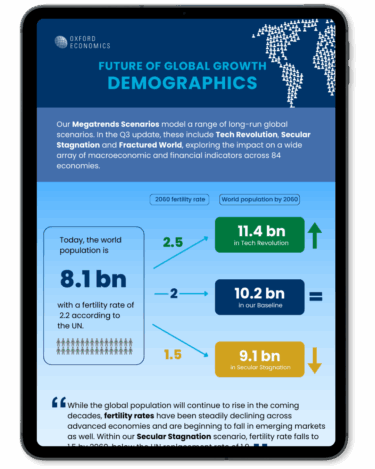Recent Release | 29 Mar 2023
The Global Economic Potential of 5G-Enabled Technology

Thought Leadership and Economic Consulting Teams
Oxford Economics

A new report by Oxford Economics, commissioned by Qualcomm Incorporated, found that 5G integration using mmWave spectrum has the potential to boost global productivity by 1.7% of global GDP in 2030 – equivalent to 10% of global GDP growth in this period.
These productivity gains are enabled through 5G’s enhanced capabilities—faster speeds, lower latency and greater traffic capacity—which will continue to unlock value across industries through new use cases, applications and services.
As a part of this study, we also surveyed executives in key markets and found that businesses are investing in anticipation of the potential benefits from 5G technology, and a majority have already started realising improvements in the speed and accuracy of their operations.
5G is also expected to be the platform for future technologies such as AI and IoT. Almost two-thirds of the executives surveyed for this study said that 5G influenced their decision to adopt IoT or cloud in their businesses, and 70% said they believed they would fall behind competition without 5G.
Other benefits of 5G technologies include greater social equity due to increased opportunities, increased remote work possibilities, encouragement of investments in technologies such as AI and IoT, and expanded access to education and health care services.
The experts behind the research
Anubhav and Matt, members of the Economic Consulting and Thought Leadership teams, are world leaders in quantitative economic analysis and original, evidence-based research, working with clients around the globe and across sectors to build models, forecast markets, run extensive surveys, and evaluate interventions using state-of-the art techniques.

Anubhav Mohanty
Associate Director, Economic Consulting

Matthew Reynolds
Senior Research Manager, Thought Leadership
Tags:
Recent technology-related reports

Future of Global Growth: Demographics
Our Megatrends Scenarios model a range of long-run global scenarios. In the Q3 update, these include Tech Revolution, Secular Stagnation and Fractured World, exploring the impact on a wide array of macroeconomic and financial indicators across 84 economies.
Find Out More
Roadblocks to China’s chip self-sufficiency dream
China is unlikely to achieve full chip self-sufficiency any time soon because of high technological hurdles in producing advanced manufacturing equipment and materials. The self-sufficiency target now stretches well beyond actual fabrication to include the entire chip supply chain as China struggles to acquire necessary input and machinery into the production process.
Find Out More
Why invest in AI ethics and governance?
In collaboration with the Notre Dame-IBM Technology Ethics Lab, Oxford Economics conducted 15 interviews with senior executives in 2024 to better understand how organizations are evaluating the ROI of AI ethics investments.
Find Out More
Global P&C Insurance Outlook to 2050
Capgemini leveraged custom macro and insurance market forecasts from Oxford Economics for their latest P&C insurance flagship report.
Find Out More